|
HIV / AIDS Course > Chapter 4 - HIV Testing
|
|
Chapter 4: HIV TestingA. Learn About HIV Testing1. Who Should Get Tested?The only way to know for sure whether you have HIV is to get tested. CDC recommends that everyone between the ages of 13 and 64 get tested for HIV at least once as part of routine health care. Knowing your HIV status gives you powerful information to help you take steps to keep you and your partner(s) healthy. About 1 in 7 people in the United States who have HIV do not know they have it.
Should You Get Tested for HIV? Everyone between the ages of 13 and 64 should get tested for HIV at least once. If your behavior puts you at risk after you are tested, you should think about being tested again. Some people at higher risk should get tested more often. If your last HIV test result was negative, you should get an HIV test if you answer "yes" to any of the questions below about your risk since that test:
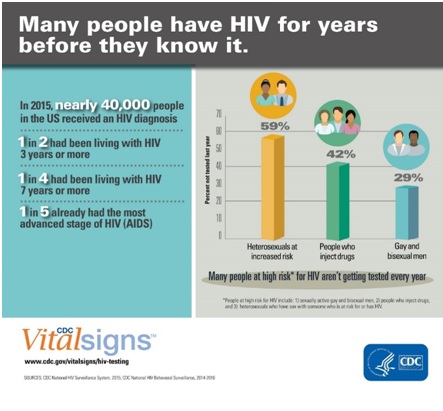 If you're pregnant, talk to your health care provider about getting tested for HIV and other ways to protect you and your child from getting HIV. Anyone who has been sexually assaulted or has had a high-risk exposure to HIV should consider taking post-exposure prophylaxis (PEP) and getting an HIV antigen test that can detect infection sooner than standard antibody testing. PEP may prevent HIV infection after possible exposure to HIV if it is started as soon as possible within 3 days after exposure to HIV. How Can Testing Help You? The only way to know for sure whether you have HIV is to get tested. Knowing your HIV status gives you powerful information to help you take steps to keep you and your partner(s) healthy.
Should You Get Tested for HIV If You Don't Think You're at High Risk? Some people who test positive for HIV were not aware of their risk. That's why CDC recommends that everyone between the ages of 13 and 64 get tested for HIV at least once as part of routine health care and that people with certain risk factors should get tested more often (see above). Even if you are in a monogamous relationship (both you and your partner are having sex only with each other), you should find out for sure whether you or your partner has HIV. Should You Get Tested for HIV If You're Pregnant? All pregnant women should be tested for HIV so that they can begin treatment if they're HIV-positive. If a woman is treated for HIV early in her pregnancy, the risk of transmitting HIV to her baby can be very low. Testing pregnant women for HIV infection, treating those who are infected, and treating their babies with antiretroviral therapy (ART) after delivery have led to a big decline in the number of children born with HIV. The treatment is most effective for preventing HIV transmission to babies when started as early as possible during pregnancy. If pregnant women are treated for HIV early in their pregnancy, the risk of transmitting HIV to their baby can be 1% or less. However, there are still great health benefits to beginning preventive treatment even during labor or shortly after the baby is born. Learn more about how to protect yourself and your partners, and get information tailored to meet your needs from CDC's HIV Risk Reduction Tool (BETA). Content Source: CDC's HIV Basics Date last updated: June 14, 2018 2. HIV Testing Locations Where Can You Get Tested for HIV?
You can get an HIV test at many places:
Many pharmacies and some community-based organizations also offer HIV testing. HIV testing is covered by health insurance without a co-pay, as required by the Affordable Care Act. If you do not have health insurance, some testing sites may offer free tests. These places can connect you to HIV care and treatment if you test positive or can discuss the best HIV prevention options for you if you test negative. You can also buy a home testing kit at a pharmacy or online. How Do I Find HIV Testing Sites Near Me? Find an HIV test site near you by using the HIV.gov HIV services locator. 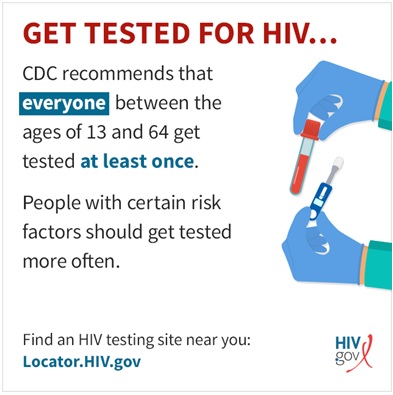 You can also find a testing site near you by:
 Content Source: HIV.gov Date last updated: May 17, 2019 3. HIV Testing Overview What Can You Expect When You Go in for an HIV Test?
If you take a test in a health care setting, when it's time to take the test, a health care provider will take your sample (blood or oral fluid), and you may be able to wait for the results if it's a rapid HIV test. If the test comes back negative, and you haven't had an exposure for 3 months, you can be confident you're not infected with HIV. If your HIV test result is positive, you may need to get a follow-up test to be sure you have HIV. Your health care provider or counselor may talk with you about your risk factors, answer questions about your general health, and discuss next steps with you, especially if your result is positive. How Soon After Exposure to HIV Can an HIV Test Detect If You Are Infected? No HIV test can detect HIV immediately after infection. If you think you've been exposed to HIV, talk to your health care provider as soon as possible. The time between when a person gets HIV and when a test can accurately detect it is called the window period. The window period varies from person to person and also depends upon the type of HIV test.
Ask your health care provider about the window period for the test you're taking and whether you will need a follow-up test to confirm the results. If you're using a home test, you can get that information from the materials included in the test's package. If you get an HIV test within 3 months after a potential HIV exposure and the result is negative, get tested again in 3 more months to be sure. If you learned you were HIV-negative the last time you were tested, you can only be sure you're still negative if you haven't had a potential HIV exposure since your last test. If you're sexually active, continue to take actions to prevent HIV, like using condoms the right way every time you have sex and taking medicines to prevent HIV if you're at high risk. 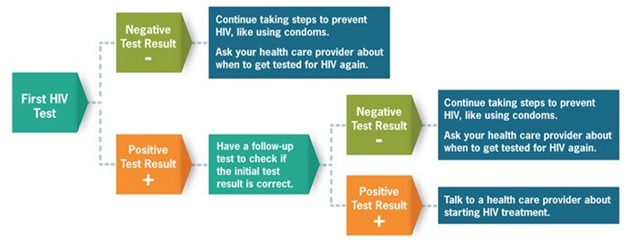 NIH/AIDSinfo: Flow Chart of Positive/Negative HIV Test Results Who Will Pay for Your HIV Test? HIV screening is covered by health insurance without a co-pay, as required by the Affordable Care Act. If you do not have medical insurance, some testing sites may offer free tests. See Where to Get Tested for information about locating a testing site near you. Content Source: Division of HIV/AIDS Prevention, and National Center for HIV/AIDS, Viral Hepatitis, Sexual Transmitted Diseases and Tuberculosis Prevention, and Centers for Disease Control and Prevention Date last updated: May 14, 2018 4. Understanding HIV Test ResultsHIV testing shows whether a person is infected with HIV. HIV stands for human immunodeficiency virus. HIV is the virus that causes AIDS (acquired immunodeficiency syndrome). AIDS is the most advanced stage of HIV infection. Learn about what a positive and negative HIV test result mean.
What Does a Negative HIV Test Result Mean? A negative result doesn't necessarily mean that you don't have HIV. That's because of the window period—the time between when a person gets HIV and when a test can accurately detect it. The window period varies from person to person and is also different depending upon the type of HIV test. Ask your health care provider about the window period for the kind of test you're taking. If you're using a home test, you can get that information from the materials included in the test's package. If you get an HIV test after a potential HIV exposure and the result is negative, get tested again after the window period for the test you're using to be sure. To learn more about the window period and when a person should get retested, see CDC's How soon after an exposure to HIV can an HIV test if I am infected?. If you get an HIV test within 3 months after a potential HIV exposure and the result is negative, get tested again in 3 more months to be sure. If you learned you were HIV-negative the last time you were tested, you can only be sure you're still negative if you haven't had a potential HIV exposure since your last test. If you're sexually active, continue to take actions to prevent HIV, like using condoms the right way every time you have sex and taking medicines to prevent HIV if you're at high risk. If You Have a Negative Test Result, Does that Mean that Your Partner Is HIV-Negative Also? No. Your HIV test result reveals only your HIV status. 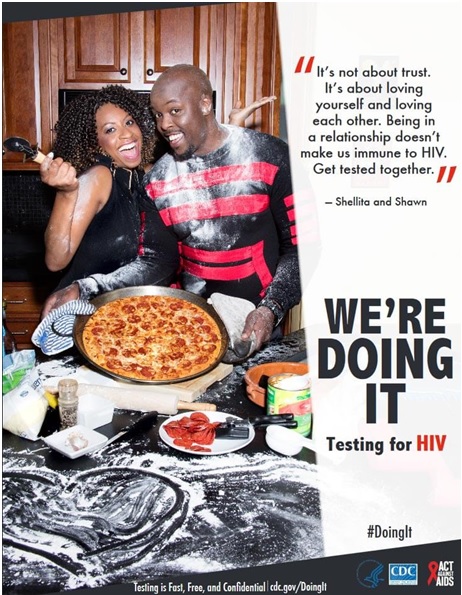 HIV is not necessarily transmitted every time you have sex. Therefore, taking an HIV test is not a way to find out if your partner is infected. It's important to be open with your partner(s) and ask them to tell you their HIV status. But keep in mind that your partner(s) may not know or may be wrong about their status, and some may not tell you if they have HIV even if they know they're infected. Consider getting tested together so you can both know your HIV status and take steps to keep yourselves healthy. What Does a Positive HIV Test Result Mean? If you have a positive HIV test result, a follow-up test will be conducted. If the follow-up test is also positive, it means you are HIV-positive. If you had a rapid screening test, the testing site will arrange a follow-up test to make sure the screening test result was correct. If you used a self-testing kit at home, a positive HIV test result must always be confirmed by additional HIV testing performed in a health care setting. If your blood was tested in a lab, the lab will conduct a follow-up test on the same sample. If your follow-up test result confirms you are infected with HIV, the next thing is to take steps to protect your health and prevent transmission to others. Begin by talking to your health care provider about antiretroviral therapy (ART). ART is the use of HIV medicines to treat HIV infection. People on ART take a combination of HIV medicines every day. ART can keep you healthy for many years and greatly reduces your chance of transmitting HIV to your sex partner(s) if taken the right way, every day. Your health care provider will help you decide what HIV medicines to take. If you have health insurance, your insurer is required to cover some medicines used to treat HIV. If you don't have health insurance, or you need help because your insurance doesn't pay for the treatment you need, there are Federal resources that may help you. To lower your risk of transmitting HIV,
Talking to others who have HIV may also be helpful. Find a local HIV support group. Learn about how other people living with HIV have handled their diagnosis. You can view stories and testimonials of how people are staying adherent to their HIV treatment and living well with HIV by visiting HIV.gov's Positive Spin. If You Test Positive for HIV, Does That Mean You Have AIDS? No. Testing positive for HIV does not mean you have AIDS. AIDS is the most advanced stage of HIV disease. HIV can lead to AIDS if not treated. See What Are HIV and AIDS for more information. Will Other People Know Your Test Result? If you take an anonymous test, no one but you will know the result. If you take a confidential test, your test result will be part of your medical record, but it is still protected by state and federal privacy laws. Most testing is done confidentially.
As a follow up to a positive HIV test, the local health department may contact you to make sure that you received the test results and understood them, and to find out whether you received referrals to HIV medical care and social services and whether you have received HIV medical care and treatment. The health department representative may talk with you about the need to tell your sexual or needle-sharing partner(s) about their possible exposure to HIV. They may also offer partner services to assist you with these conversations. If you want, the health department can try attempt to locate any or all of your partners to let them know they may have been exposed to HIV. They will be able to help them find a place to get tested and give them information about PrEP, PEP, and other ways that they can protect themselves and access other prevention and care services. If you are HIV-positive, it is important to disclose your HIV status to your health care providers (doctors, dentists, etc.) so that they can give you the best possible care. You may also consider disclosing your status to others. Content Source: CDC's HIV Basics Date last updated: May 14, 2018 https://www.hiv.gov/hiv-basics/hiv-testing/learn-about-hiv-testing/understanding-hiv-test-results Just Diagnosed: What's Next?1. Living with HIVToday, an estimated 1.1 million people are living with HIV in the United States. Thanks to better treatments, people with HIV are now living longer—and with a better quality of life—than ever before. If you are living with HIV, it's important to make choices that keep you healthy and protect others.
Stay Healthy You should start medical care and begin HIV treatment as soon as you are diagnosed with HIV. Taking medicine to treat HIV, called antiretroviral therapy (ART) is recommended for all people with HIV. Taking medicine to treat HIV slows the progression of HIV and helps protect your immune system. The medicine can keep you healthy for many years and greatly reduces your chance of transmitting HIV to sex partner(s) if taken the right way, every day. 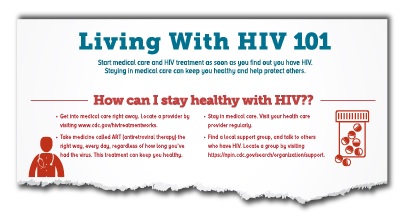 Download CDC's Living With HIV 101 Consumer Info Sheet (PDF 578 KB) If you're taking medicine to treat HIV, visit your health care provider regularly and always take your medicine as directed to keep your viral load (the amount of HIV in the blood and elsewhere in the body) as low as possible. Visit CDC's HIV Treatment Works to find information on getting in care and staying in care if you have HIV. Do Tell It's important to disclose your HIV status to your sex and needle-sharing partner(s) even if you are uncomfortable doing it. Communicatingwith each other about your HIV status allows you and your partner to take steps to keep both of you healthy. Many resources can help you learn ways to disclose your status to your partner(s). For tips on how to start the conversation with your partner, check out CDC's Let's Stop HIV Together and Start Talking. Stop HIV. campaigns. Also, ask your health department about free partner notification services. Health department staff can help find your sex or needle-sharing partner(s) to let them know they may have been exposed to HIV and provide them with testing, counseling, and referrals for other services. These partner notification services will not reveal your name unless you want to work with them to tell your partners. Many states have laws that require you to tell your sexual partners if you're HIV-positive before you have sex (anal, vaginal, or oral) or tell your needle-sharing partners before you share drugs or needles to inject drugs. In some states, you can be charged with a crime if you don't tell your partner your HIV status, even if your partner doesn't become infected. Get Support Receiving a diagnosis of HIV can be a life-changing event. But having HIV is by no means a death sentence. Pay attention to your mental health. People can feel many emotions—sadness, hopelessness, and even anger. Allied health care providers and social service providers, often available at your health care provider's office, will have the tools to help you work through the early stages of your diagnosis and begin to manage your HIV. Talking to others who have HIV may also be helpful. Find a local HIV support group. Learn about how other people living with HIV have handled their diagnosis. You can view stories and testimonials of how people are living well with HIV at Positive Spin or on the websites for CDC's Let's Stop HIV Together and HIV Treatment Works. You can also find many other resources on HIV Treatment Works for people living with HIV. Reduce the Risk to Others HIV is spread through certain body fluids from an HIV-infected person: blood, semen, pre-seminal fluid, rectal fluids, vaginal fluids, and breast milk. In the United States, HIV is most often transmitted by having anal or vaginal sex with someone who has HIV without using a condom or taking medicines to prevent or treat HIV. In addition, a mother can pass HIV to her baby during pregnancy, during labor, through breastfeeding, or by pre-chewing her baby's food. The higher your viral load, the more likely you are to transmit HIV to others. When your viral load is very low (called viral suppression, with fewer than 200 copies per milliliter of blood) or undetectable (about 40 copies per milliliter of blood), your chance of transmitting HIV is greatly reduced. However, this is true only if you can stay virally suppressed. One thing that can increase viral load is not taking HIV medicines the right way, every day. You can also protect your partners by getting tested and treated for other STDs. If you have both HIV and some other STD with sores, like syphilis, your risk of transmitting HIV can be about 3 times as high as if you didn't have any STD with sores. Taking other actions, like using a condom the right way every time you have sex or having your partners take daily medicine to prevent HIV (called pre-exposure prophylaxis or PrEP) can lower your chances of transmitting HIV even more. Learn the right way to use male condom. Read more about medicines (antiretroviral treatments) for people living with HIV. Read more on HIV and opportunistic infections (infections that are more frequent or more severe because of immunosuppression in HIV-infected persons). Content Source: HIV.gov Date last updated: May 15, 2017 2. Talking About Your HIV StatusShould You Tell Other People about Your Positive Test Result?
It's important to share your status with your sex partner(s) and/or people with whom you inject drugs. Whether you disclose your status to others is your decision. Partners It's important to disclose your HIV status to your sex partner(s) and anyone you shared needles with, even if you are not comfortable doing it. Communicating with each other about your HIV status means you can take steps to keep both of you healthy. The more practice you have disclosing your HIV status, the easier it will become. Many resources can help you learn ways to disclose your status to your partners. For tips on how to start the conversation with your partner(s), check out CDC's Start Talking. Stop HIV. campaign. If you're nervous about disclosing your test result, or you have been threatened or injured by a partner, you can ask your doctor or the local health department to help you tell your partner(s) that they might have been exposed to HIV. This type of assistance is called partner notification or partner services. Health departments do not reveal your name to your partner(s). They will only tell your partner(s) that they have been exposed to HIV and should get tested. Many states have laws that require you to tell your sexual partners if you're HIV-positive before you have sex (anal, vaginal, or oral) or tell your drug-using partners before you share drugs or needles to inject drugs. In some states, you can be charged with a crime if you don't tell your partner your HIV status, even if you used a condom or another type of protection and the partner does not become infected. Health Care Providers Your health care providers (doctors, clinical workers, dentists, etc.) have to know about your HIV status in order to be able to give you the best possible care. It's also important that healthcare providers know your HIV status so that they don't prescribe medication for you that may be harmful when taken with your HIV medications. Some states require you to disclose your HIV-positive status before you receive any health care services from a physician or dentist. For this reason, it's important to discuss the laws in your state about disclosure in medical settings with the healthcare provider who gave you your HIV test results. Your HIV test result will become part of your medical records so that your doctor or other healthcare providers can give you the best care possible. All medical information, including HIV test results, falls under strict confidentiality laws such as the Health Insurance Portability and Accountability Act's (HIPAA) Privacy Rule and cannot be released without your permission. There are some limited exceptions to confidentiality. These come into play only when not disclosing the information could result in harm to the other person. Family and Friends In most cases, your family and friends will not know your test results or HIV status unless you tell them yourself. While telling your family that you have HIV may seem hard, you should know that disclosure actually has many benefits—studies have shown that people who disclose their HIV status respond better to treatment than those who don't. If you are under 18, however, some states allow your health care provider to tell your parent(s) that you received services for HIV if they think doing so is in your best interest. For more information, see the Guttmacher Institute's State Policies in Brief: Minors' Access to STI Services . Employers In most cases, your employer will not know your HIV status unless you tell them. But your employer does have a right to ask if you have any health conditions that would affect your ability to do your job or pose a serious risk to others. (An example might be a health care professional, like a surgeon, who does procedures where there is a risk of blood or other body fluids being exchanged.) If you have health insurance through your employer, the insurance company cannot legally tell your employer that you have HIV. But it is possible that your employer could find out if the insurance company provides detailed information to your employer about the benefits it pays or the costs of insurance. All people with HIV are covered under the Americans with Disabilities Act. This means that your employer cannot discriminate against you because of your HIV status as long as you can do your job. To learn more, see the Department of Justice's ADA.gov/HIV website. It may help you to hear stories about how others are living with HIV and how they've shared their status with partners, family, and friends. Visit Positive Spin or CDC's websites for Let's Stop HIV Together and HIV Treatment Works. For more information about sharing your HIV status, visit CDC's HIV Treatment Works campaign's content on sharing your status. Learn more about how to protect yourself and your partners, and get information tailored to meet your needs from CDC's HIV Risk Reduction Tool (BETA). Content Source: CDC's HIV Basics Date last updated: May 15, 2017 ----------------------------------------------------------------------------------------------------------------------- [ QN.No.# 20. It is recommended that sexually active gay and bisexual men who have more that one partner should be tested ____. a) every week b) every 3 to 6 months c) once a year d) as soon as they notice flu-like symptoms] |
|
|
HIV / AIDS Course > Chapter 4 - HIV Testing
Page Last Modified On:
Deprecated: Function strftime() is deprecated in /home/devxspeedy/public_html/lib/smarty-3.1.34/libs/plugins/modifier.date_format.php on line 81 December 30, 2019, 11:25 AM |
|
